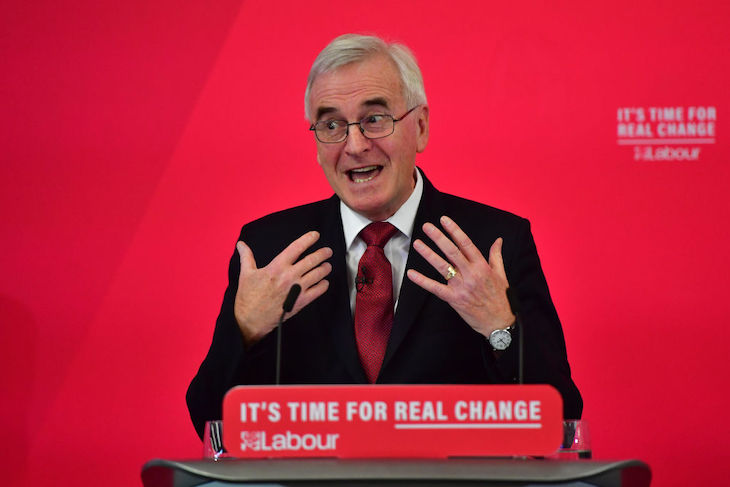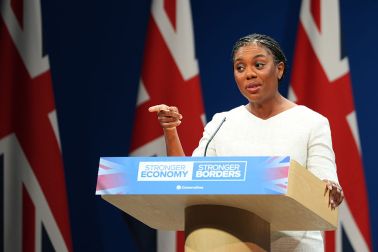John McDonnell claimed in a speech in Birmingham today that the Labour party’s plans to expand free childcare, cut rail ticket prices, and introduce free prescriptions and free school meals, along with various other measures, would save the average family £6,700 a year.
Given how much Labour had allocated for these promises in the costings document accompanying its manifesto, I immediately suspected that their figures would not add up. But having seen the Labour dossier which costs this claim, it is impossible to stress – even by the standards of modern politics – how shoddy these numbers are and how quickly they fall apart.
This document comes in two parts, the ‘cost of the Tories’ and ‘savings under Labour’. You can see the summary here:

The first and most important point to make is that Labour’s household is nothing like the UK average household. This is a ‘household’ in which two working parents are rich enough to both commute into London (or another big city), pay for their own NHS prescriptions and receive zero state help with childcare. Yet at the same time they are poor enough to still be renting their home – and, according to the final paragraph of that summary, may still be earning the minimum wage.
The next point is that these costings are from a universe in which inflation does not exist. Every single bill increase between 2010 and 2019 is calculated on the basis of the current figures, rather than the real-term costs. But when it comes to wages, Labour miraculously discovers the phrase ‘real terms’. So the entire ‘cost of living crisis’ section is comparing apples with porcupines.
As for the ‘savings under Labour’ section, it’s even worse. Again, we’re examining the same mythical dual-commuting couple, simultaneously earning a six-figure salary who are also on the breadline. Some of the ‘savings’ are ‘promised by 2030 if nationalisation goes well’. And the estimates for water and energy bill savings under nationalisation cite a paper which literally doesn’t even mention the topic.
Now, I don’t expect you to take my word for it, so I’m going to go through each of the figures and explain why they aren’t accurate.
The document first claims that since 2010, under the Tories, people are paying:
‘£68 more for their dual-fuel energy bill’ between 2010 and 2019
When you adjust for inflation, this becomes around £233 less than people were paying in 2010.
‘£75 more for their water bill’
Adjusted for inflation, this is roughly £16 less.
‘£204 more for their broadband bill’
For once, a fair cop. Broadband is more expensive than in 2010 (though also much faster). But it’s only gone up by £161 per year in real terms.
‘£1,740 more for season rail tickets’
In a disgracefully shoddy document, this is one of the shoddiest figures of all. According to Department for Transport statistics, only 11 per cent of people in the UK commute by train (compared to 68 per cent who drive). How can you then claim that the ‘average household’ has not one, but two people commuting daily by train? That’s without adding in inflation, which brings the increase in cost per head down from £870 to £191. Or pointing out that in a document where everything else is costed for 2019, Labour have sneaked in the 2020 figure for season tickets.
‘£1,916 more on average for childcare per child’
Did I say the season ticket figure was dodgy? It’s pure as snow compared to this claim. Labour’s childcare costings cite the Family and Childcare Trust’s annual survey, which is an entirely respectable document. But as the report itself says, it doesn’t include what the government is paying in childcare subsidies. Which is just, y’know, a mere £6 billion a year.
This Department for Education report from 2014-15 gives a rough idea of the amount parents are actually spending on childcare out of their own pocket. Unsurprisingly, it is far less than the Labour figure. If we take the weekly mean cost of £53 (rather than the median cost of £23), we end up with an annual figure of £2,756. That’s a lot. But it’s less than half the average cost for 2019 suggested by Labour, of £6,206.
A side note: gloriously, Labour hasn’t even calculated the actual average childcare cost. It’s just taken the figure for two-year-olds at nursery and childminders for two-and-overs and averaged them, with no attempt to work out how many children there are in each category.
‘£22 more on yearly prescription charges’
Two problems with this. First, inflation – which actually turns this into a £1.68 saving. Secondly, 84 per cent of NHS prescriptions are available for free. So what this should actually say is: ‘if you have to pay for one prescription a month, out of your own pocket, your annual costs between 2010 and 2019 went, er, down by £1.68’.
‘£1,924 more on rent’
Again, this ignores that pesky thing called inflation. In fact, after multiplying the 2010 figure by inflation, average rents are down by £250.
The next half of the document covers ‘Labour’s plan for real change’.
Again, they are using the same non-existent ‘average household’. But in this case, some of the ‘over £6,700’ that they promise to save is to be delivered by 2030. In the case of energy bills, the bulk of the saving comes from home insulation – which Labour’s own documents show will be funded by £190 billion in loans, which homeowners will have to repay out of the savings.
Oh, and the remainder of the energy savings, and the promised £113 on water bills? That is sourced to a study by the University of Greenwich which – as best as I can say – does not actually contain any figures relating to consumer savings from renationalisation, or address the topic at all.
In fact, having gone through every single claim made by Labour in this document, it is truly impressive that not a single one of them comes without significant and occasionally fatal qualifications.
It is also truly impressive that the Guardian managed to ‘fact-check’ this document, without raising a single one of these points (apart from some quibbles about the prospects of nationalisation and the 2030 deadline).
Now, I have done these calculations quickly. There may be some minor errors or objections. For example, you may argue that I should have used another multiplier rather than inflation. It is also the case that the other parties have often been economical with the facts (Lib Dem bar charts, anyone?). And I am on the side of capitalism and free markets and all the rest of it – to the point where I volunteered briefly for the Conservative Party during this campaign – so I obviously come to Labour’s promises with more of a sceptical eye.
But claiming that ‘the average household’ has been cost X by the Tories, but would save Y under Labour – when you don’t look at the average household, you only count inflation when it helps you, and you have tortured other figures to breaking point – is naked deceit.
Robert Colvile is Director of the Centre for Policy Studies






Comments